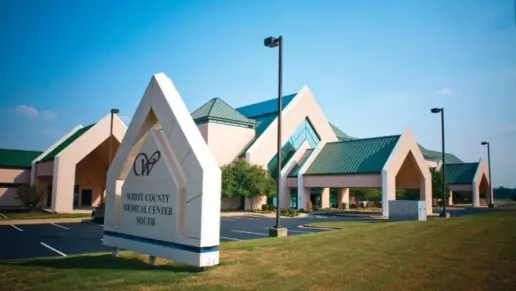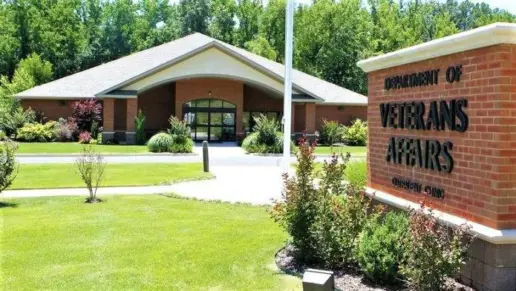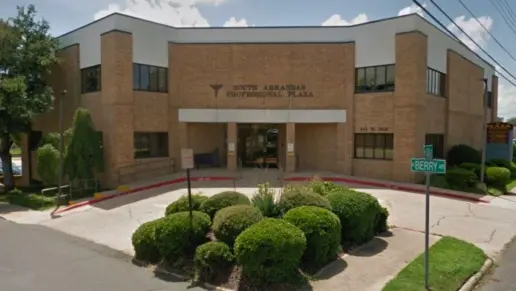About Western Arkansas Counseling and Guidance Center, Inc (The Guidance Center)
Western Arkansas Counseling and Guidance Center is a CARF accredited outpatient behavioral healthcare provider in Fort Smith, Arkansas. CARF accreditation indicates a commitment to quality care. They provide mental health counseling and treatment for substance use disorders. They may even tackle dual diagnosis conditions. This is when you’re experiencing both mental health and substance use issues. Specialized services are also available for youth aged 13 to 17.
Their staff are highly skilled and experienced in mental health and addiction therapy. I like that they prioritize individualized care because this tailors treatment to your unique needs. I also appreciate that they offer very affordable services with flexible funding options. This includes Medicaid, Medicare and various private insurance plans.
You can consider their outpatient services if you need flexible treatment for a mild to moderate substance use disorder. You’ll receive 72 hours of residential treatment in their crisis stabilization unit if you are experiencing serious mental health and substance use disorders.
Their outpatient program starts with substance use treatment and continues with individual and group therapy. Group therapy creates a supportive network that promotes learning with individuals who have experiences similar to yours. You’ll learn how to communicate effectively, manage your mood and build healthy relationships. This strengthens your coping and relapse prevention skills and allows you to better control negative behavioral patterns that fuel substance abuse.
They may offer medication assisted treatment (MAT) if relevant to your recovery. This technique uses FDA approved medicines and counseling to support recovery from opioid or alcohol addiction.
Their program integrates medication management to help those with dual diagnosis conditions. They also provide a court ordered education program for DUI and DWI offenders. Another cool thing about this facility is that their services include telehealth support. This means you can potentially receive therapeutic support from the comfort of your home. They also offer family counseling and case management services.
Once you complete treatment you may receive aftercare. This provides ongoing support for long term success. These services may include continued counseling, support groups and referrals to community resources.
Rehab Score
Other Forms of Payment
Private insurance refers to any kind of healthcare coverage that isn't from the state or federal government. This includes individual and family plans offered by an employer or purchased from the Insurance Marketplace. Every plan will have different requirements and out of pocket costs so be sure to get the full details before you start treatment.
Self-pay involves paying for treatment out of your own pocket. You can use savings or credit, get a personal loan, or receive help from family and friends to fund your treatment. If you don't have insurance or your insurance plan doesn't cover a specific program, self-pay can help ensure you still get the care you need.
Financial aid can take many forms. Centers may have grants or scholarships available to clients who meet eligibility requirements. Programs that receive SAMHSA grants may have financial aid available for those who need treatment as well. Grants and scholarships can help you pai for treatment without having to repay.
Sliding scale payments are based on a client's income and family size. The goal is to make treatment affordable to everyone. By taking these factors into account, addiction recovery care providers help ensure that your treatment does not become a financial burden to you or your family, eliminating one barrier to care.
Medicare is a federal program that provides health insurance for those 65 and older. It also serves people under 65 with chronic and disabling health challenges. To use Medicare for addiction treatment you need to find a program that accepts Medicare and is in network with your plan. Out of pocket costs and preauthorization requirements vary, so always check with your provider.
Military members, veterans, and eligible dependents have access to specific insurance programs that help them get the care they need. TRICARE and VA insurance can help you access low cost or no cost addiction and mental health treatment. Programs that accept military insurance often have targeted treatment focused on the unique challenges military members, veterans, and their families face.
Medicaid is a state based program that helps lower-income individuals and families pay for healthcare. Medicaid covers addiction treatment so those enrolled can use their coverage to pay for rehab. When a program accepts Medicaid the client often pays very little or nothing out of their own pocket.
Addiction Treatments
Levels of Care
Programs



Clinical Services
One of the most common types of psychotherapy, cognitive behavioral therapy in Arkansas is an effective tool for the treatment of substance use disorder. It is a common therapeutic method that is used to treat a variety of mental and behavioral health challenges.
Developed in the 1970s, dialectical behavior therapy (DBT) is a type of psychotherapy based in cognitive behavior therapy. DBT is designed specifically to help people who experience emotions intensely. It is used to treat substance use disorder, anxiety, and depression, among other mental health disorders.
Group therapy offers men and women the opportunity to learn essential coping skills from their peers who have practiced these skills in the community. You learn new communication techniques and relapse prevention strategies that promote sobriety and sustainable recovery.
Individual therapy gives men and women in Arkansas the chance to engage in one on one therapy sessions that focus on identifying personal triggers and high risk situations for drug and alcohol addiction. Your therapist works together with you to develop coping strategies and build resilience that promotes sustainable recovery.
Motivational interviewing is a conversational approach to treatment. It helps you express your desire for change, reflect on any ambivalence you're feeling about change, and plan for the next steps to make the changes you desire.
The goal of trauma therapy is to address the lingering mental, emotional, and physical lingering effects of a traumatic event. Your therapist helps you process this trauma and build resilience to face future challenges.
If you participate in couples therapy, your therapist may use one or more methods to help you improve communication and resolve conflict. These techniques can include emotionally focused therapy, psychodynamic couple's therapy, and cognitive behavioral therapy.
Families in Arkansas use family therapy to enhance communication and understand the effect that addiction has on family members. The goal is to help members identify and modify negative behaviors and create a more cohesive and supportive environment that is conducive to recovery.
Developing life skills while undergoing rehab treatment in Arkansas is a crucial part of your recovery. During treatment, you may focus on learning communication skills, critical thinking skills, problem solving, self awareness, assertiveness, and coping skills.
Amenities
-
Residential Setting
-
Private Rooms
Accreditations

The Commission on Accreditation of Rehabilitation Facilities (CARF) is a non-profit organization that specifically accredits rehab organizations. Founded in 1966, CARF's, mission is to help service providers like rehab facilities maintain high standards of care.
CARF Accreditation: Yes

State Licenses are permits issued by government agencies that allow rehab organizations to conduct business legally within a certain geographical area. Typically, the kind of program a rehab facility offers, along with its physical location, determines which licenses are required to operate legally.
State License: Arkansas
Contact Information
3111 S 70th St
Fort Smith, AR 72903


